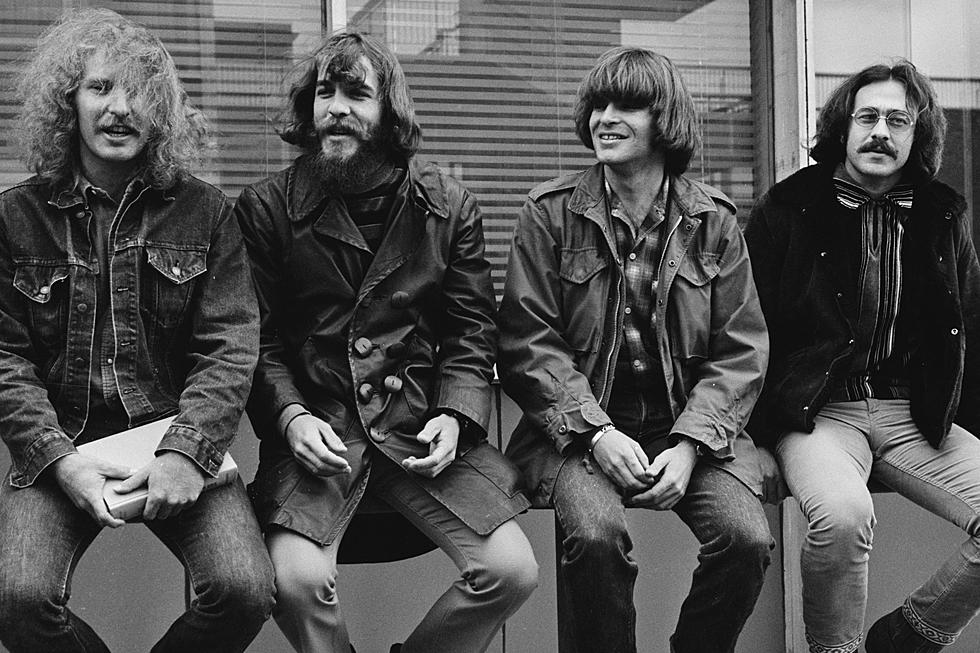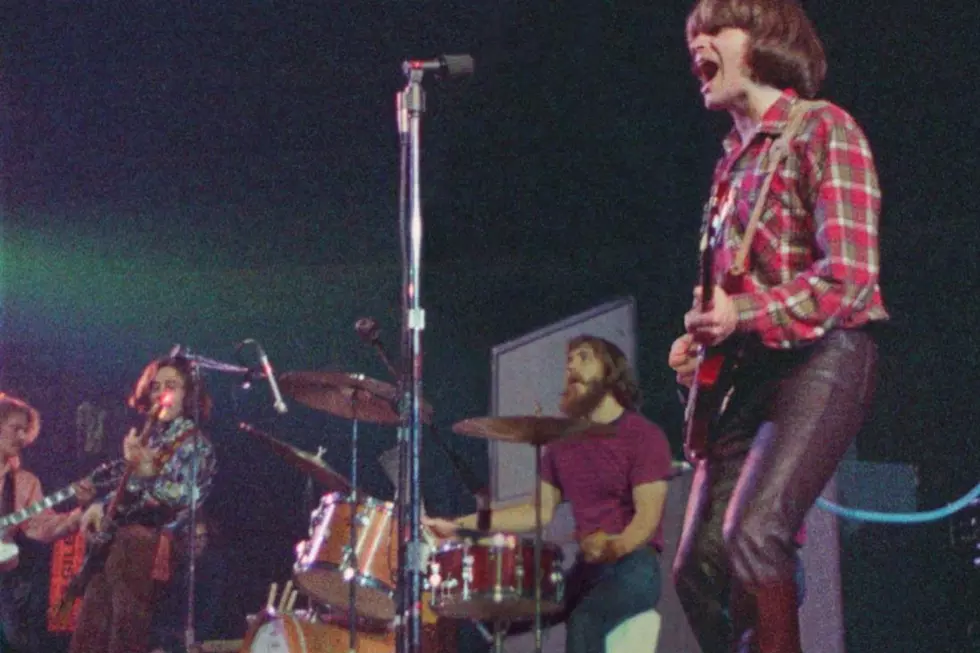
The Life and Death of Creedence Clearwater Revival’s Tom Fogerty
He’s been overshadowed by his kid brother, but Tom Fogerty still holds a significant place in rock history. As the rhythm guitarist for Creedence Clearwater Revival, Tom played on plenty of rock classics and had a solo career before his death on Sept. 6, 1990, at the age of 48.
Born on Nov. 9, 1941 in Berkeley, Calif., Tom was bitten by the rock n’ roll bug as a teenager, like so many others in the late ‘50s. He formed a band, Spider Webb and the Insects, that was signed in 1959 to Del-Fi Records, the label that made Richie Valens a star. They only recorded one song for the label, “Lyda Jane,” but it was never released and the group broke up shortly thereafter.
Meanwhile, his brother John Fogerty, who was three-and-a-half years younger, had an instrumental trio of his own called the Blue Velvets featuring a rhythm section of two of his schoolmates, Doug Clifford (drums) and Stu Cook (piano). Looking for new musicians to record some demos, Tom found the answer in his own DNA and joined the Blue Velvets. As the oldest and most experienced member of the group — as well as the only one who could sing — Tom became the frontman and leader.
The Blue Velvets made a name for themselves in the Bay Area by working the usual circuit afforded to teenage bands — county fairs, sock hops, etc. — while continuing to record demos of the songs the brothers were writing together. They attracted the attention of a small local label, Orchestra Records, but the three singles they put out between October 1961 and June 1962 couldn’t gain any traction outside local radio.
But they kept at it, paying their dues, until they wound up seeing a television program about a local jazz label called Fantasy that had a national hit with Vince Guaraldi’s “Cast Your Fate to the Wind.” They dropped off their demo and the label, who saw an opportunity to break into rock, signed them, with Max Weiss – who founded the label with his brother – suggesting they get a more modern name.
They chose the Visions, but when Fantasy put out the first single, "Don't Tell Me No Lies" b/w "Little Girl (Does Your Momma Know)” in mid-1964, Weiss had changed their name again. He said “The Golliwogs” sounded more British. To reinforce the whimsical nature that went along with their name, they wore matching paisley shirts and vests, with fuzzy white wigs.
Over the next three years, they released seven singles for Fantasy and their subsidiary, Scorpio, to little acclaim. This period saw John and Clifford spend time in the military reserves, even as a few major changes took place: Cook switched from piano to bass and John discovered his voice as a singer, replacing his brother as the frontman. Also, the Weiss brothers decided to get out of the music business and sold the label to their director of sales and marketing, Saul Zaentz.
By late 1967, San Francisco had supplanted England as the home of rock, and Zaentz wanted them to change their name to something that was more reflective of the burgeoning counterculture. Eventually, they settled on Creedence Clearwater Revival.
The next few years have been written into the annals of rock history. Between July 1968 and December 1970, Creedence choogled their way through six albums and a slew of Top 10 singles of extraordinary quality, including three — Bayou Country, Green River and Willy and the Poor Boys — in 1969 alone.
In addition to singing lead, John now wrote all the songs and was hailed as one of the most important lyricists of his generation. Tom’s lone credit, a co-write with his brother, was actually a two-year old Golliwogs called “Walk on the Water” that they re-recorded for their debut. This led to a great deal of friction between the brothers, which came to a head when Tom quit in January 1971, a month after Pendulum's release.
“Tom had put up with a lot of s— from John,” Clifford told Uncut. “I think Tom was expecting John to say, ‘OK, now we’ve achieved our goals, why don’t you start singing a few of the songs?’ Tom had a great voice, kinda like Ritchie Valens. Tom would have done a damn good job on ‘La Bamba’. But John didn’t want him to sing it, in case we had a hit with it. He didn’t want Tom to succeed.”
John Fogerty saw it differently. As he bluntly said to the Guardian in 2000, “The best I can say in Tom's case is he was the older brother and the younger brother had a lot more talent, therefore he was jealous even to a greater degree than the other two in Creedence Clearwater Revival."
Listen to the Golliwogs Perform ‘Don’t Tell Me No Lies’
Like Fredo Corleone in The Godfather, Part II, the older brother felt stepped over and wanted respect, and decided to make a name for himself. Thankfully, it didn't end with him being shot in a rowboat on his brother’s orders. Creedence lasted one more album, recording the disappointing Mardi Gras as a trio, before breaking up in October 1972.
Tom Fogerty signed a solo deal with Fantasy and, for a pair of albums in 1972, found some sympathetic musical partners with members of a Jerry Garcia side project: Merl Saunders, Bill Vitt and John Kahn. The self-titled first record peaked at a respectable No. 78, but the second, Excalibur, failed to chart. Clifford and Cook provided the musical backbone for 1974’s Zephyr National, and John Fogerty helped out by playing guitar on the CCR soundalike track, “Joyful Resurrection,” which is embedded at the top. But not even a full-fledged Creedence Clearwater Revival reunion — the last track featuring all four members — could tempt the public. After Myopia, another 1974 effort, he hooked up with a Bay Area band called Ruby for three albums between 1976 and 1984. Another solo album, Deal It Out, followed in 1981.
The lack of commercial success became the least of his problems. At some point in the ‘80s, after moving to Scottsdale, Ariz., Tom underwent surgery for his back. But an unscreened blood transfusion caused him to be infected with AIDS virus. It led to his 1990 death, officially of tuberculosis.
Unfortunately, the wounds caused by the split between the brothers never healed. In a 1986 interview, Tom Fogerty admitted that he hadn’t heard John’s comeback album, Centerfield, beyond the first single, “The Old Man Down the Road.” He even seemed to take pleasure in John’s famous decades-long, litigation-filled feud with Zaentz over control of the publishing rights to his songs.
"Tom ended up over the years evolving mentally into some sort of weird Patti Hearst syndrome," John Fogerty later said. "That's what I call it when they kidnap you and you end up siding with your captors, and that's what Tom did. In some trick of mental agility, he ended up befriending Saul Zaentz against me. By the end of his life Tom was saying 'Saul is my best friend.' He even wrote me nasty letters saying things like 'Saul and I will win.' It was very unresolved and very sad."
When Creedence Clearwater Revival was inducted into the Rock and Roll Hall of Fame in 1993, Tom Fogerty’s widow brought his ashes in an urn. John, however, refused to share the stage with his former bandmates.
Creedence Clearwater Revival Albums Ranked
More From Ultimate Classic Rock









